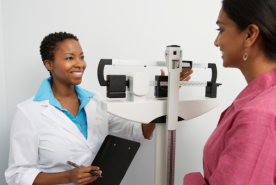Physical fitness is very important in today's world. Everyone is enjoying the benefits of greater strength and feeling better. Exercise keeps your body strong and healthy.
How does exercise benefit me?
With exercise, it becomes easier to get around, do your necessary tasks and still have some energy left over for other activities you enjoy.
In addition to increased energy, other benefits from exercise may include:
- Improved muscle physical functioning
- Better blood pressure control
- Improved muscle strength
- Lowered level of blood fats (cholesterol and triglycerides)
- Better sleep
- Better control of body weight
Do I need to see my doctor before starting exercise?
Yes. Before beginning any exercise program, be sure to check with your doctor.
When planning a directed exercise program, you need to look at four things:
- Type of exercise
- Length of time you spend exercising
- How often you exercise
- How hard you work while exercising.
Here are some tips on each:
Type of Exercise
Choose continuous activity such as walking, swimming, bicycling (indoors or out), skiing, aerobic dancing or any other activities in which you need to move large muscle groups continuously.
Low-level strengthening exercises may also be beneficial as part of your program. Design your program to use low weights and high repetitions, and avoid heavy lifting.
How Hard to Work While Exercising
This is the most difficult to talk about without knowing your own exercise capacity. Usually, the following ideas are helpful:
- Your breathing should not be so hard that you cannot talk with someone exercising with you. (Try to get an exercise partner such as a family member or a friend.) You should feel completely normal within one hour after exercising. (If not, slow down next time.)
- You should not feel so much muscle soreness that it keeps you from exercising the next session.
- The intensity should be a "comfortable push" level.
- Start out slowly each session to warm up, then pick up your pace, then slow down again when you are about to finish.
The most important thing is to start slowly and progress gradually, allowing your body to adapt to the increased levels of activity.
Are there any times when I should not exercise?
Yes. You should not exercise without talking with your doctor if any of the following occurs:
- You have a fever
- You have changed your dialysis schedule
- You have changed your medicine schedule
- Your physical condition has changed
- You have eaten too much
- The weather is very hot and humid, unless you exercise in an air-conditioned place
- You have joint or bone problems that become worse with exercise
If you stop exercising for any of these reasons, speak to your doctor before beginning again.

















